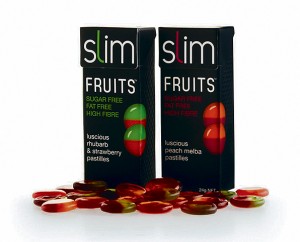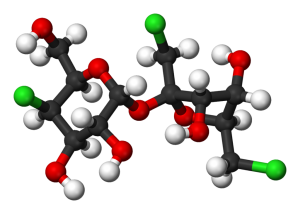New from Australian confectionery company Ferndale, Slim Fruits claims to be the healthiest sweet on the market. But what are they really like? We look at the taste, the look and ultimately the science behind this “diet friendly” sweet treat.
The look
The pastilles look fairly unassuming, a little like a squashed wine gum or like candy that’s been made for kids (I could easily imagine a big smiley face on them and being used in party bags). The packaging, however, is a little more grown-up looking, sleek black and bright colours and something that wouldn’t look too out of place in your handbag. It’s clear to see that this product has been unashamedly designed for females, but for some reason I just can’t hate it despite that.

The taste
I have a bit of a mixed opinion when it comes to the taste of these. I loved the Peach Melba flavour, which tasted juicy and so very very sweet and naughty but for me the Rhubarb and Strawberry fell flat. That’s not to say everyone felt that way, a colleague of mine enjoyed the sharp but sweet combination of those more than my favourites and devoured most of that box before I had the chance.
The diet science
The manufacturers claim that each pack of Slim Fruits contains 40% natural bioactive soluble dietary fibre (40g per 100g). This comes from acacia gum derived from acacia trees in Africa. This substance is natural and any claims linked to adverse effects have been discounted by the European Food Safety Authority. This fibre, however, is not the same as that found in other fruits, so cannot be compared to equivalent levels in other foods. With this in mind, Slim Fruits provides around 1.9g of dietary fibre, around the same amount of fibre that you would get from one banana or about 20 almonds with their skin on.
The other area that the makers are keen to highlight is the fact that the product is sugar free. To compensate for sugar, they have used sucralose, also known as E995, which is an artifical sweetener made from sucrose (table sugar). It’s far sweeter in taste that sugar, which means it is usually used in small amounts and is the ingredient for many well known sweetener brands such as Splenda. Sucralose is calorie-free as it cannot be digested by humans and so passes through the body. It is also praised as it doesn’t cause damage to teeth in the way that sugar does. Although there has been a lot of debate over the safety and health implications of sucralose, to date it is still deemed as safe to use in food products and most of the studies that have proven anything otherwise have used samples of rats and have been concluded as insufficient data. So, sucralose is no worse for you than most equivalents and at least it has the no-calorie and at least it doesn’t damage your teeth or add calories.
This product will not make you lose weight, and despite the hope you may feel when you read the name, it doesn’t actually claim to do this. The sweets are designed to be a healthier alternative to other sweets, with no calories and added fibre. And, if used in this way, they could help to aid weight loss when combined with a healthy diet and exercise.
The verdict
Although I had my clear favourite in the flavours, I have to say that both had a pretty good taste considering that they are a sugar-free product. It’s a great idea for those who are trying to slim but find it hard to fulfil their sweet cravings. Also great that they come in a handy pocket-size pack, good for on the move. The fear I would have is making sure I stuck to the recommended portion of five pastilles a day, as you could see negative effects otherwise. Generally a good product and one that I’m sure many more brands will look to copy in the near future.
More info
Website: http://www.slimfruits.com.au/
Stockists: The best places to buy these in the UK are Holland and Barrett, Superdrug and Boots
RRP: £1.89 per 24g box (buy one get one half price at H&B currently)

